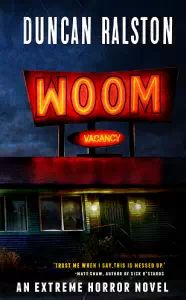"I believe pain lingers," Angel said. "Do I believe in spirits? In the supernatural? Probably not."
The Lonely Motel holds many dark secrets… and Room 6 just might possess the worst of them all.
Angel knows all about pain. His mother died in this room. He’s researched its history. Today he’s come back to end it, no matter the cost, once and for all.
Shyla, a plus-sized escort, thinks the stories Angel tells her can’t be true. Secrets so vile, you won’t want to let them inside you.
But the Lonely Motel doesn’t forget. It doesn’t forgive. And it always claims its victim.
Pretty sure, this happened to you before also: you buy a book, because of recommendations and… well… can’t really understand the hype.
Shit happens!
But, what also sometimes happens (still way to rarely): you feel, you literally know, that the first impression is deceptive; or just misinterpreted…
Hell, it can be so beautiful to be wrong!
Here he sits and waits. For her. In this woom room. Welcome her to tell his story…
There may be many words to describe more or less appropriately what it means to write a book about a man, a hooker and a room, but none is more accurate than the one chosen by the author himself: Woom!
After the last page, the first (noticeable) impression was that I expected something different after all. In retrospect, I can give this expectation a name: obviousness.
Yeah, what I expected was an easy book, an uncomplicated reading-pleasure.
A tad of tension, little slaughter, bit of time and that’s it; over and done. Well, what I finally got is… more!
The book may have found its physical end, but in the imaginary it just really begins now! It needs the (physical) end, in order to be able to capture this moment in which you close your eyes…
…and then it starts – it begins! Like the book would actually just begins now, as if a seed had been planted, which is now sprouting, from which the actual creation is now developing.
Terror grows out of Horror, less social criticism than a kind of social-drama – a reflection I seem to serve as a mirror.
Ralston creates a kind of short story collection around his protagonist as a novel – a memory formed in individual acts and finally finds perfection in the actual coincidence; an organism that recreates itself anew every moment.
The violence, as a primordial act that influences on me as a reader, finds its origin in the totality and not in a mere deed. Like I’m standing right in front of a painting and the brushstrokes already reproduce genius and delusion – and with every step I take further away from it, it doesn’t lose details, but rather gains monstrosity! From the details grows an understanding, the strokes become forms, until this totality grows out of itself and strengthens the consciousness for life as well as for passing; the contrast that we scold as life, could we call it death also.
The deeper I immerse myself in the memory, the more I deal with what I have read (experienced?), the bigger the life/death peels out of this seed, the more often I think of names like Bukowski, Selby or Pollock.
Ralston creates an intimacy that doesn’t contrast with the repulsiveness of the occurrences, but rather plays around with them; it presents them in a fragility that finds its unambiguity in the interplay of need and condition.
Any self-evidence gives way to an inevitability – aspiration instead of consequence.
The burden that the nature of madness carries within itself: knowledge; knowledge as the last bastion.
Woom is not a wild, but a grandiosely structured mixture of New American Gothic, Splatterpunk and Drama; or in one word: Anti.
Anti-Hero, Anti-Romance, Anti-Moment, Anti-Consequence…
Conclusion?
Woom!
Period.

Be First to Comment